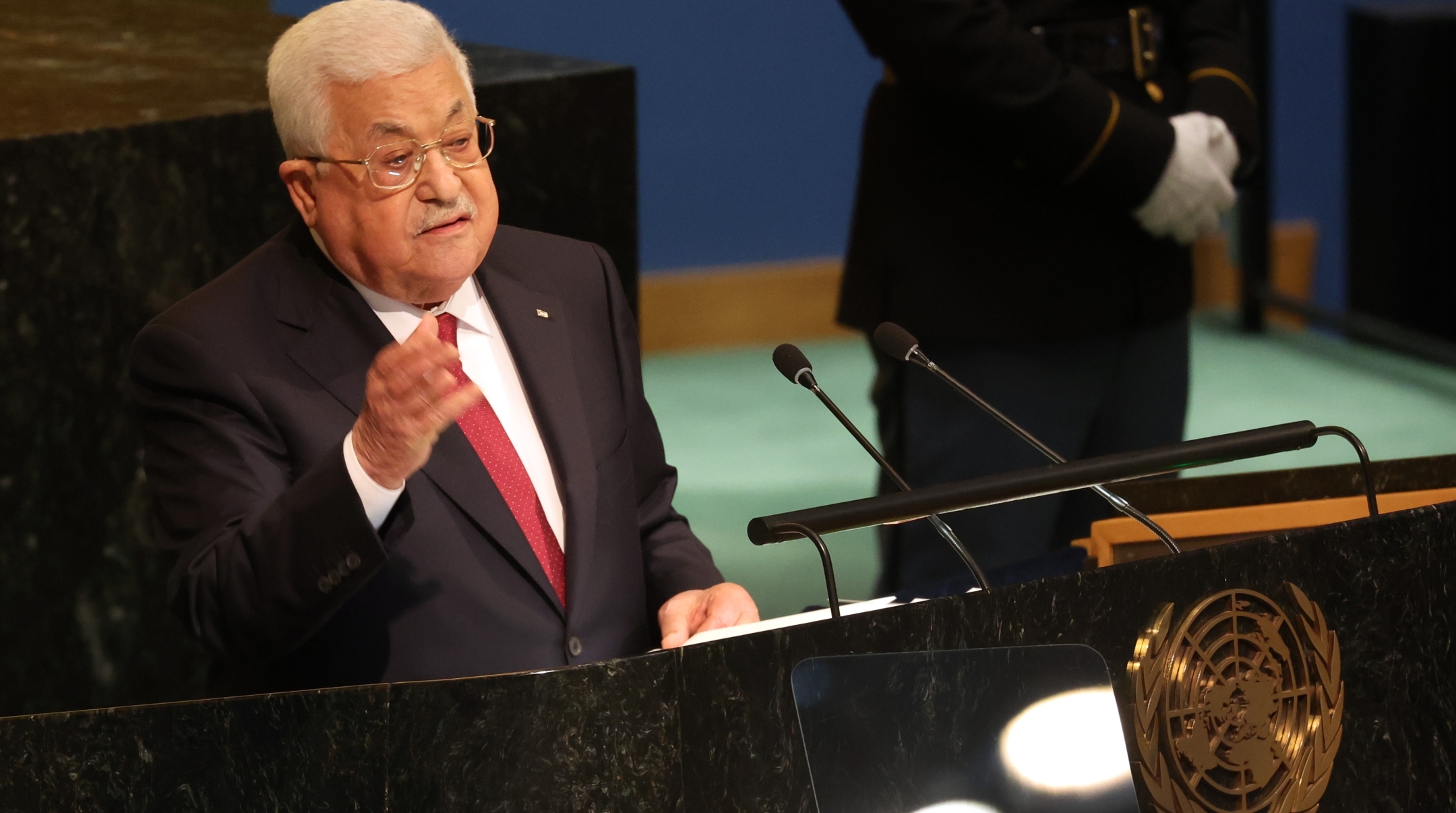‘We must speak to the Zionist lobby’: Mahmoud Abbas urges Palestinian Americans to engage with AIPAC
The call is significant at a time that some on the left and among pro-Palestinian groups have called for disengagement with the pro-Israel lobby

Palestinian president Mahmoud Abbas speaks at the 77th session of the United Nations General Assembly at U.N. headquarters in New York City, Sept. 23, 2022. (Spencer Platt/Getty Images)
(JTA) — Palestinian Authority President Mahmoud Abbas has emphatically encouraged dialogue with the American Israel Public Affairs Committee, or AIPAC, despite his disagreements with the center-right pro-Israel lobby and calls among the pro-Palestinian community to disengage from the group.
In a recording of his meeting last month with Palestinian Americans on the sidelines of the United Nations’ General Assembly in New York City obtained by The Times of Israel, Abbas also faulted the current Biden administration for not doing enough to pressure Israel into reopening Israeli-Palestinian peace negotiations.
“You must talk to everyone in order to arrive at your goal … You must not exclude anyone … including the Zionist lobby,” Abbas said. “There are many people who say that the Zionist lobby is the most dangerous. No! We must speak to the Zionist lobby.”
He added that George Mitchell, the former Maine senator who led negotiations with the Israelis and the Palestinians in the first Obama administration term, told Abbas not to meet with AIPAC. Mitchell denied that narrative in a statement to The Times of Israel.
“President Abbas’ recollection is incorrect as to me. I don’t know about his conversations with others, but I can state categorically that there never was any such conversation with me,” Mitchell wrote.
Abbas’ endorsement of engagement with AIPAC is significant as calls from the left and among pro-Palestinians to boycott and disengage from the group grow louder — in part because it is friendly with Republicans who are close to former President Donald Trump and in part because it was seen as an enabler of former Israeli Prime Minister Benjamin Netanyahu, who largely abandoned the Israeli-Palestinian peace process over the course of his tenure.
Abbas said J Street, the Jewish Middle East policy lobby set up as a dovish counterweight to AIPAC, was “nice,” but he emphasized that it was important to reach out to the predominant voices, noting that he prioritized meetings with Netanyahu’s Likud Party and has also maintained outreach to U.S. Republicans, who are among the Palestinian Authority’s fiercest critics.
Hussein al-Sheikh, the secretary general of the Palestine Liberation Organization, an affiliate of the Palestinian Authority, as recently as Sept. 13 met with an AIPAC delegation and posted about it on Twitter.
The Trump administration cut off all funding to the Palestinians, shut down the PLO’s Washington office and closed the U.S. consulate in eastern Jerusalem that attended to the Palestinians. President Joe Biden has restored funding, reestablished dedicated diplomatic relations with the Palestinians and hopes to reopen the Washington office.
Abbas told the Palestinian Americans that these measures were not enough and that the Biden administration should pressure Israel. He said in his most recent conversation with Antony Blinken, the U.S. secretary of state, he derided Blinken for saying that Israel was not ready to resume talks and leaving it at that.
“I told Blinken, ‘You little boy, don’t do that,’” he said. A source familiar with the conversation told The Times of Israel that Abbas’ characterization of the Biden administration’s work on the issue was not accurate.
Israeli Prime Minister Yair Lapid has until recently argued that his fragile right-to-left coalition of parties is not in a position to advance talks with the Palestinians. However, Lapid appeared to modify that position speaking to the U.N. General Assembly last month, when he embraced the two-state outcome for the Israeli-Palestinian conflict. That effectively reversed the policies of Netanyahu, who rejected Palestinian statehood, and aligned Israel with Biden’s policy, which the president emphasized in his own U.N. speech.
This article originally appeared on JTA.org.















